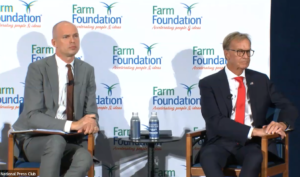 The American Farm Bureau Federation asked Vice President Kamala Harris and former President Donald Trump about their priorities for American agriculture in a questionnaire that included their opinions on renewable fuels.
The American Farm Bureau Federation asked Vice President Kamala Harris and former President Donald Trump about their priorities for American agriculture in a questionnaire that included their opinions on renewable fuels.
Farm Bureau asked the question, “As president, would you support an all-of-the-above strategy that encourages the domestic production and use of all available forms of energy?”
The Harris-Walz campaign response:
Vice President Harris cast the deciding vote to pass the Inflation Reduction Act, which provided nearly $10 billion for rural renewable energy infrastructure—and made the largest investment in rural electrification in nearly 90 years. This historic legislation also included more than $2 billion in investments for the Rural Energy for America program, which provides loans and grants to agricultural producers and rural small businesses to build renewable energy systems or to make energy efficiency improvements. The Inflation Reduction Act is also increasing domestic biofuels, boosting high-quality job opportunities across rural America and enlisting agriculture as a pivotal tool to fight climate change.
Former President Trump’s response:
Yes, a Trump Administration will increase domestic energy production across the board, streamline permitting, and end market-distorting restrictions on Oil, Natural Gas, and Coal. I will lower energy prices even below the record lows achieved during my first term. No president has ever fought harder for our farmers than I did. I issued a rule declaring that E15 would be made available all year round. In addition, I dramatically increased the number of fueling stations where E15 could be sold across the country, by letting them use the existing pumps. I will cancel every Kamala-Biden policy that is brutalizing our farmers. We won’t just increase Ethanol production in our own country, we will make it our mission to export ethanol all over the world.
Other topics on the questionnaire included crop insurance, taxes, labor, regulatory reform, international trade, sustainability, and biotechnology.











